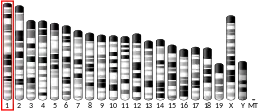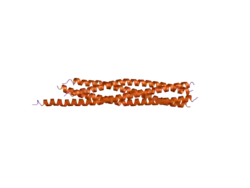VAMP4
Vesicle-associated membrane protein 4 is a protein that in humans is encoded by the VAMP4 gene.[5][6]
| VAMP4 | |||||||||||||||||||||||||||||||||||||||||||||||||||
|---|---|---|---|---|---|---|---|---|---|---|---|---|---|---|---|---|---|---|---|---|---|---|---|---|---|---|---|---|---|---|---|---|---|---|---|---|---|---|---|---|---|---|---|---|---|---|---|---|---|---|---|
| Identifiers | |||||||||||||||||||||||||||||||||||||||||||||||||||
| Aliases | VAMP4, VAMP-4, VAMP24, vesicle associated membrane protein 4 | ||||||||||||||||||||||||||||||||||||||||||||||||||
| External IDs | OMIM: 606909 MGI: 1858730 HomoloGene: 37847 GeneCards: VAMP4 | ||||||||||||||||||||||||||||||||||||||||||||||||||
| |||||||||||||||||||||||||||||||||||||||||||||||||||
| |||||||||||||||||||||||||||||||||||||||||||||||||||
| |||||||||||||||||||||||||||||||||||||||||||||||||||
| |||||||||||||||||||||||||||||||||||||||||||||||||||
| Wikidata | |||||||||||||||||||||||||||||||||||||||||||||||||||
| |||||||||||||||||||||||||||||||||||||||||||||||||||
Function
Synaptobrevins/VAMPs, syntaxins, and the 25-kD synaptosomal-associated protein SNAP25 are the main components of a protein complex involved in the docking and/or fusion of synaptic vesicles with the presynaptic membrane. The protein encoded by this gene is a member of the vesicle-associated membrane protein (VAMP)/synaptobrevin family. This protein may play a role in trans-Golgi network-to-endosome transport.[6]
References
- GRCh38: Ensembl release 89: ENSG00000117533 - Ensembl, May 2017
- GRCm38: Ensembl release 89: ENSMUSG00000026696 - Ensembl, May 2017
- "Human PubMed Reference:". National Center for Biotechnology Information, U.S. National Library of Medicine.
- "Mouse PubMed Reference:". National Center for Biotechnology Information, U.S. National Library of Medicine.
- Advani RJ, Bae HR, Bock JB, Chao DS, Doung YC, Prekeris R, Yoo JS, Scheller RH (Apr 1998). "Seven novel mammalian SNARE proteins localize to distinct membrane compartments". The Journal of Biological Chemistry. 273 (17): 10317–24. doi:10.1074/jbc.273.17.10317. PMID 9553086.
- "Entrez Gene: VAMP4 vesicle-associated membrane protein 4".
- Hinners I, Wendler F, Fei H, Thomas L, Thomas G, Tooze SA (Dec 2003). "AP-1 recruitment to VAMP4 is modulated by phosphorylation-dependent binding of PACS-1". EMBO Reports. 4 (12): 1182–9. doi:10.1038/sj.embor.7400018. PMC 1326413. PMID 14608369.
- Mallard F, Tang BL, Galli T, Tenza D, Saint-Pol A, Yue X, Antony C, Hong W, Goud B, Johannes L (Feb 2002). "Early/recycling endosomes-to-TGN transport involves two SNARE complexes and a Rab6 isoform". The Journal of Cell Biology. 156 (4): 653–64. doi:10.1083/jcb.200110081. PMC 2174079. PMID 11839770.
Further reading
- Andersson B, Wentland MA, Ricafrente JY, Liu W, Gibbs RA (Apr 1996). "A "double adaptor" method for improved shotgun library construction". Analytical Biochemistry. 236 (1): 107–13. doi:10.1006/abio.1996.0138. PMID 8619474.
- Yu W, Andersson B, Worley KC, Muzny DM, Ding Y, Liu W, Ricafrente JY, Wentland MA, Lennon G, Gibbs RA (Apr 1997). "Large-scale concatenation cDNA sequencing". Genome Research. 7 (4): 353–8. doi:10.1101/gr.7.4.353. PMC 139146. PMID 9110174.
- Steegmaier M, Klumperman J, Foletti DL, Yoo JS, Scheller RH (Jun 1999). "Vesicle-associated membrane protein 4 is implicated in trans-Golgi network vesicle trafficking". Molecular Biology of the Cell. 10 (6): 1957–72. doi:10.1091/mbc.10.6.1957. PMC 25394. PMID 10359608.
- Scales SJ, Chen YA, Yoo BY, Patel SM, Doung YC, Scheller RH (May 2000). "SNAREs contribute to the specificity of membrane fusion". Neuron. 26 (2): 457–64. doi:10.1016/S0896-6273(00)81177-0. PMID 10839363.
- Peden AA, Park GY, Scheller RH (Dec 2001). "The Di-leucine motif of vesicle-associated membrane protein 4 is required for its localization and AP-1 binding". The Journal of Biological Chemistry. 276 (52): 49183–7. doi:10.1074/jbc.M106646200. PMID 11598115.
- Mallard F, Tang BL, Galli T, Tenza D, Saint-Pol A, Yue X, Antony C, Hong W, Goud B, Johannes L (Feb 2002). "Early/recycling endosomes-to-TGN transport involves two SNARE complexes and a Rab6 isoform". The Journal of Cell Biology. 156 (4): 653–64. doi:10.1083/jcb.200110081. PMC 2174079. PMID 11839770.
- Zeng Q, Tran TT, Tan HX, Hong W (Jun 2003). "The cytoplasmic domain of Vamp4 and Vamp5 is responsible for their correct subcellular targeting: the N-terminal extenSion of VAMP4 contains a dominant autonomous targeting signal for the trans-Golgi network". The Journal of Biological Chemistry. 278 (25): 23046–54. doi:10.1074/jbc.M303214200. PMID 12682051.
- Hinners I, Wendler F, Fei H, Thomas L, Thomas G, Tooze SA (Dec 2003). "AP-1 recruitment to VAMP4 is modulated by phosphorylation-dependent binding of PACS-1". EMBO Reports. 4 (12): 1182–9. doi:10.1038/sj.embor.7400018. PMC 1326413. PMID 14608369.
- Rual JF, Venkatesan K, Hao T, Hirozane-Kishikawa T, Dricot A, Li N, Berriz GF, Gibbons FD, Dreze M, Ayivi-Guedehoussou N, Klitgord N, Simon C, Boxem M, Milstein S, Rosenberg J, Goldberg DS, Zhang LV, Wong SL, Franklin G, Li S, Albala JS, Lim J, Fraughton C, Llamosas E, Cevik S, Bex C, Lamesch P, Sikorski RS, Vandenhaute J, Zoghbi HY, Smolyar A, Bosak S, Sequerra R, Doucette-Stamm L, Cusick ME, Hill DE, Roth FP, Vidal M (Oct 2005). "Towards a proteome-scale map of the human protein-protein interaction network". Nature. 437 (7062): 1173–8. Bibcode:2005Natur.437.1173R. doi:10.1038/nature04209. PMID 16189514. S2CID 4427026.
- Olsen JV, Blagoev B, Gnad F, Macek B, Kumar C, Mortensen P, Mann M (Nov 2006). "Global, in vivo, and site-specific phosphorylation dynamics in signaling networks". Cell. 127 (3): 635–48. doi:10.1016/j.cell.2006.09.026. PMID 17081983. S2CID 7827573.
This article is issued from Wikipedia. The text is licensed under Creative Commons - Attribution - Sharealike. Additional terms may apply for the media files.






